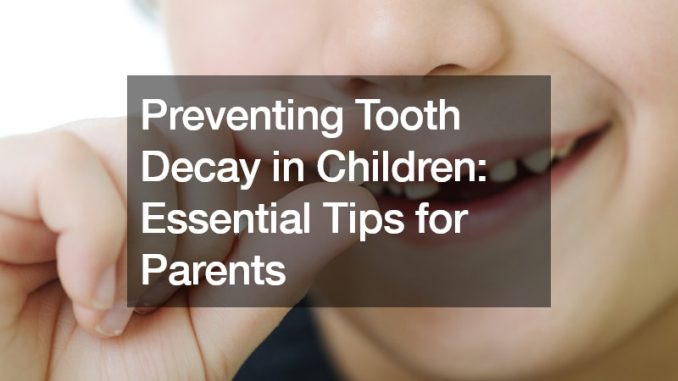

A healthy smile is a vital part of a child’s well-being. Tooth decay, however, is a common childhood concern, and unfortunately, baby teeth are more susceptible to cavities than adult teeth. The good news is that with proper care and preventive measures, you can significantly reduce your child’s risk of developing cavities.
Understanding Tooth Decay in Children
Unlike adult teeth, baby teeth have a thinner layer of enamel, the hard outer shell protecting teeth from decay. This makes them more vulnerable to cavities caused by plaque, a sticky film that forms on teeth from sugary foods and drinks.
When plaque isn’t removed through brushing and flossing, bacteria in the plaque feed on sugar and produce acid. This acid erodes tooth enamel, leading to cavities.
While cavities in baby teeth might seem like a minor concern since they’ll eventually fall out, leaving them untreated can have serious consequences. Untreated cavities are painful for children and can spread to permanent teeth developing below the gum line. Premature tooth loss due to cavities can also impact speech development and cause orthodontic problems later in life.
Early Steps to a Healthy Smile
The journey to good oral health begins even before your child’s first tooth erupts. Wipe your baby’s gums with a damp, soft cloth after feedings to remove milk residue and prevent bacteria buildup. This establishes a healthy oral care routine from the very beginning.
Brushing and Flossing: Building Good Habits
When your child’s first tooth comes in, it’s time to start brushing. Use a soft toothbrush made for babies and toddlers, and put just a tiny bit of fluoride toothpaste on it, like the size of a rice grain. Until your child learns to brush well on their own (usually around 2-3 years old), brush their teeth gently twice a day, in the morning and before bed. As they get better at brushing, let them do it by themselves while you watch to make sure they clean all their teeth.
Flossing is just as important as brushing for removing plaque and food particles between teeth. Once your child has teeth that touch (usually around age 2), start flossing once a day. Floss picks designed for children can make this process easier and more fun.
Fluoride: A Powerful Ally
Fluoride is a mineral that strengthens tooth enamel and helps prevent cavities. Most toothpastes contain fluoride, but for additional protection, your kids dentist may recommend a fluoride supplement, especially if your child’s water supply is not fluoridated.
Diet: Fueling Healthy Smiles
A balanced diet plays a crucial role in preventing tooth decay. Limit sugary foods and drinks, as the sugars in these can fuel cavity-causing bacteria. Opt for healthy snacks like fruits, vegetables, and cheese instead. If your child does have sugary treats, make sure they brush their teeth afterwards.
Water: The Perfect Beverage
Water is the best drink for your child’s overall health, including their oral health. Encourage water consumption throughout the day, especially after meals and snacks. Avoid sugary drinks like juice, soda, and sports drinks, as they can contribute to tooth decay.
Regular Dental Checkups: Early Detection and Prevention
Schedule regular dental checkups for your child starting around their first birthday or when their first tooth erupts. These visits allow the kids dentist to monitor your child’s oral health for signs of cavities and other potential problems. Early detection and treatment of cavities can prevent them from becoming more serious and causing pain or complications.
Making Brushing Fun
Brushing teeth can be a struggle for some children. Here are some tips to make it a more enjoyable experience:
- Choose a colorful, child-sized toothbrush with their favorite cartoon character.
- Use a fun-flavored fluoride toothpaste suitable for children.
- Play a two-minute song while they brush to ensure they brush for the recommended time.
- Brush your teeth together and make it a fun bonding experience.
Rewarding Positive Behavior
Positive reinforcement can go a long way in encouraging good oral hygiene habits. Use praise stickers or a reward chart to celebrate your child’s brushing and flossing accomplishments.
Leading by Example
Children learn by observing their parents. Make brushing and flossing a regular part of your own routine and let your child see how important you consider oral health to be.
Partnering with Your Kids Dentist
Your kids dentist is your partner in ensuring your child’s oral health. They can provide personalized guidance on brushing techniques, flossing, fluoride supplements, and dietary recommendations specific to your child’s needs. Don’t hesitate to ask questions and address any concerns you may have about your child’s oral health.
By following these essential tips and working together with your kids dentist, you can set your child on the path to a lifetime of healthy smiles.
.
